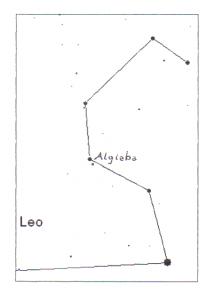Sky Object of the Month – April 2012 Double Star Gamma Leonis - Algieba
One of the finest double stars in the spring sky – indeed, in all the heavens – is gamma () Leonis. Its proper name, Algieba, comes from the Arabic Al Jabbah (The Lion’s Mane).
Discovered by William Herschel in 1782, Algieba is comprised of magnitude 2.4 and 3.6 stars currently separated by 4.6 arc-seconds. They form a slowly widening binary system with an orbital period estimated at between 5 and 6 centuries.
Algieba is easily located - it’s the brightest star (after Regulus) in the “Sickle” of Leo. The pair is marginally resolved in small-aperture telescopes with medium power. On an evening of steady seeing, I barely split Algieba with a 3-inch reflector at 60X. A clean split, however, requires a magnification of 100X or more.
What makes Algieba so visually striking are its rich golden-yellow hues, indicative of its K0 and G7 spectra. Some observers note a slight greenish tinge to the companion. Do you agree?
Discovered by William Herschel in 1782, Algieba is comprised of magnitude 2.4 and 3.6 stars currently separated by 4.6 arc-seconds. They form a slowly widening binary system with an orbital period estimated at between 5 and 6 centuries.
Algieba is easily located - it’s the brightest star (after Regulus) in the “Sickle” of Leo. The pair is marginally resolved in small-aperture telescopes with medium power. On an evening of steady seeing, I barely split Algieba with a 3-inch reflector at 60X. A clean split, however, requires a magnification of 100X or more.
What makes Algieba so visually striking are its rich golden-yellow hues, indicative of its K0 and G7 spectra. Some observers note a slight greenish tinge to the companion. Do you agree?
- Author:
- Glenn Chaple
- Entry Date:
- Apr 1, 2012
- Published Under:
- Glenn Chaple's Columns


